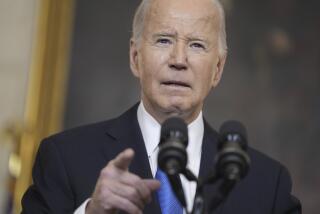Senate OKs Nevada Site for Storing U.S. Nuclear Waste but Veto Looms
- Share via
WASHINGTON — The Senate passed legislation Thursday that would provide a permanent site for disposal of the nation’s nuclear waste, but the 64-34 vote fell short of the two-thirds majority that Republicans would need to override a veto, apparently continuing a six-year impasse.
The government already has proposed that the spent nuclear fuel be deposited in a facility to be built at Yucca Mountain, Nev., 237 miles northeast of Los Angeles, but the White House and Republicans are at odds over how to go about it.
President Clinton opposes a GOP provision that would limit the role of the Environmental Protection Agency in setting standards for how much radiation the waste facility could emit and has threatened to veto the legislation if the House approves similar language.
The provision would require the EPA to consult with the Nuclear Regulatory Commission and the National Academy of Sciences, which favor less stringent standards, if it wants to issue such regulations before June 1, 2001. After that, however, the EPA could act entirely on its own.
Proponents said that the legislation must be passed soon or the nation will face a crisis. About 40,000 tons of highly radioactive spent nuclear fuel already have piled up in about 80 separate storage areas in 40 states. Some of the facilities are almost filled to capacity.
The government was supposed to have taken custody of the spent fuel by 1998, but Congress and the White House have been unable to agree on how to do it. Republicans have tried for six years to push their own plan through Congress.
The bill now goes to the House, where its fate is uncertain. The House Commerce Committee approved slightly different legislation last year, but the measure never reached the floor. The Senate postponed action on the bill in 1998 after Democrats mounted a filibuster.
Even so, GOP leaders conceded that their failure to win the minimum 67 votes that would be required to override a veto means that the legislation is unlikely to become law. Sen. Frank H. Murkowski (R-Alaska) said that the bill is “dead until we get a new administration.”
Murkowski had tried to win more Democratic votes by abandoning a provision to require the Energy Department to take title to the spent fuel while it is in state storage areas--a plan some governors had feared would jeopardize its removal.
But Democrats remained firmly opposed on a variety of other issues. In the end, only 12 Democrats voted for the legislation, while two Republicans voted against it. California Sens. Barbara Boxer and Dianne Feinstein, both Democrats, voted against it.
The two sides had made several last-ditch efforts to hammer out a compromise earlier this week but were unable to agree on some key issues. Republicans in both houses had earmarked the legislation as a priority.
Thursday’s relatively weak vote in the Senate came despite a warning by Murkowski, who served as floor manager for the legislation, that failure to take action now would cripple the nuclear power industry in the United States.
“We cannot risk doing nothing; we are in danger of losing 180 nuclear power plants,” Murkowski told senators in an emotional floor speech just before the final vote. He dismissed opponents’ objections to the bill as “smoke screens” that had no basis in fact.
But Sen. Richard H. Bryan (D-Nev.), one of the bill’s leading critics, branded Murkowski’s measure “a legislative vessel that’s flying under false colors.” He said: “All we are asking is, don’t play politics with the [radiation] standards.”
The bill was passed despite strong opposition from Bryan and Nevada’s other senator, Democrat Harry Reid. Both repeatedly have fought attempts by Congress to intervene in the nuclear waste controversy. Nevada is fighting development of the Yucca Mountain site.
Murkowski said that Republicans were not trying to take decision-making power away from the EPA in requiring that it consult with other agencies before it sets radiation exposure standards. “The effort is to get the best science,” he told the Senate.
But Senate Minority Leader Tom Daschle (D-S.D.) said that Democrats were “much more comfortable” with the EPA setting the standards alone. “We’re not very happy about the way things have worked out,” he told reporters. “We’re hoping to save the bill in conference.”
The nuclear power industry quickly applauded the Senate action, while environmentalists again criticized the legislation. Nuclear power plants provide about 20% of the electric generating capacity in the United States, according to government figures.
More to Read
Sign up for Essential California
The most important California stories and recommendations in your inbox every morning.
You may occasionally receive promotional content from the Los Angeles Times.










